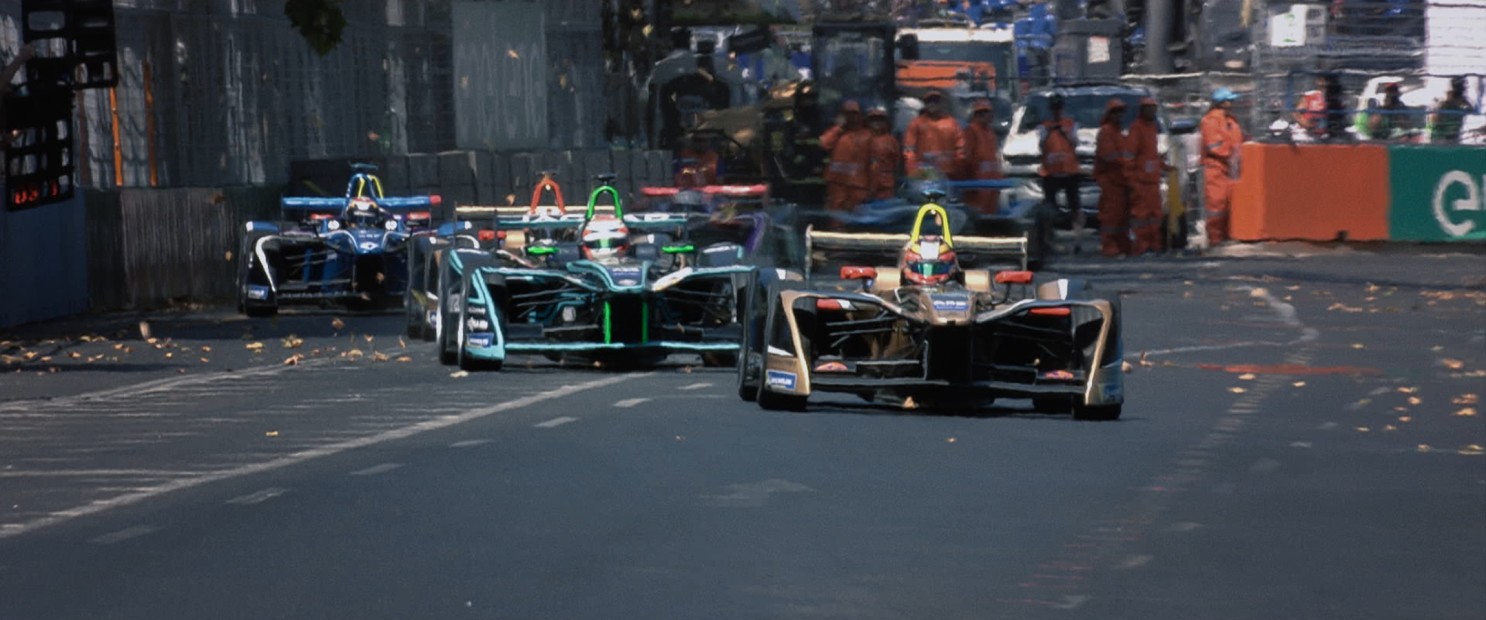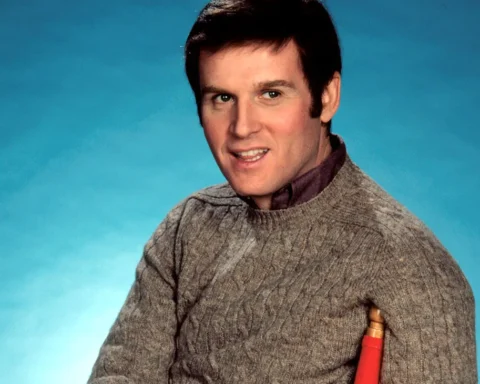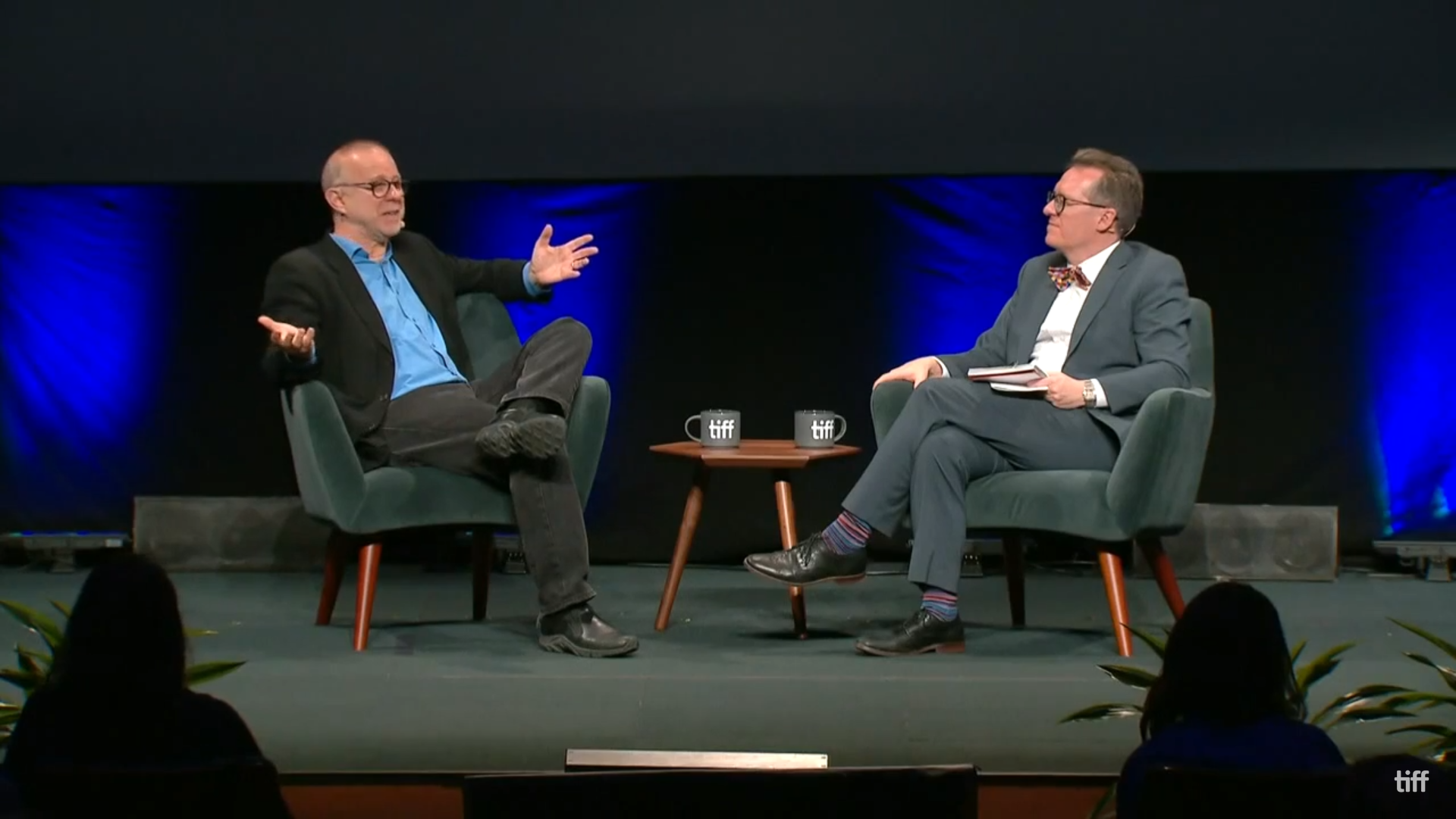Fisher Stevens has had a diverse career in cinema, as an actor on television and film, a director and a producer of both fiction and non-fiction works. He produced the 2009 Oscar winning film The Cove, and directed the 2016 climate change film Before The Flood, which was narrated and co-produced by Leonardo DiCaprio. For his latest project And We Go Green, Stevens has teamed up with photographer and filmmaker Malcolm Venville to tell a different environmentally conscious tale, one that merges perfectly with the adrenaline rush of a sports doc.
Formula E is a battery powered eco-friendly offshoot from the same sporting world that brought Formula 1 to the fore, an international competition that finds drivers racing vehicles that feature screaming electric engines rather than the guttural roar of a conventional petroleum-based power unit. Any major racing event is full of colourful characters, and the film does remarkably well at working for newcomer and fan alike, braving the balance through a series of exciting races and impressive new technologies.
POV spoke to the pair by phone following the world premiere of their film at TIFF 2019.

Photo by George Pimentel / Wireimage for TIFF
POV: Jason Gorber
FS: Fisher Stevens
MV: Malcolm Venville
This interview has been edited for brevity and clarity.
POV: What brought you to the story?
FS: Leonardo DiCaprio invited me to a race in Brooklyn. He thought that documenting Formula E would make for a really good environmental film that will get a different audience, reaching people who don’t ordinarily think about climate change. I was not very interested because I just don’t care about cars or racing and thought I had had enough of environmental films. But at the same time, knowing that Donald Trump is president, I couldn’t really just quit now, knowing that we have a climate denialist in the White House. I don’t even think he’s a denialist, I think he’s just a guy that loves money and only thinks about money, and the fossil fuel industry was willing to give him enough money to deny climate change.
POV: How did that lead you to collaborate with Malcolm?
FS: I thought if I’m going to do this, I’m going to need some help from someone who knows about racing. Not only does Malcolm know about racing, he is a fine filmmaker. We ended up going to Valencia and staying together for the testing—not just the testing for Formula E but also a testing for Malcolm and I to see if there was a movie there. And there we met Alejandro Agag [CEO of Formula E] and got to know him. We met all of the drivers and we realized maybe we could do something.
MV: We went and hung out at this testing session in Valencia and kind of auditioned the drivers. Fish really used ESP and picked out Jean-Eric Vergne (JEV) and we decided to follow him along with Sam Bird. Everything fell into place. The drivers did well in the championship. We had a good bit of lady luck, put it that way.
POV: Malcolm, you were then ostensibly the “petrolhead” of the team?
MV: I grew up in Birmingham (in the UK). My parents were in the car industry, as were my grandparents. I was an apprentice at Land Rover, but when Margaret Thatcher tore everything apart, I ended up going to arts school and eventually film. I used to build cars and try and race them, but of course I never had any money. I had that yearning, burning desire as a kid, and when Fish called me, it was like a little dream come true.
POV: So you knew JEV from his days prior to Formula E?
MV: I knew all of the drivers—who they were and their backgrounds. I keep an eye on the sport. And I remember JEV getting a really rough time at Red Bull. I had fallen out of love with Formula One many years ago, so Formula E is super exciting to me because it’s all about racing again, not about multinational corporations. It is about drivers and teams racing out of pure passion.
POV: Fisher, you were more in the dark?
FS: The only driver I’d ever heard was Lewis Hamilton. I didn’t know any of them and didn’t really care. I love British football, but now Malcolm and I watch Formula E. We live in different countries, but we text each other during the races.
POV: This seems to be the core balance of the film, between giving enough new info to racing fans without intimidating neophytes.
FS: Well, that was a huge challenge for us, and I’m glad that you said that. The reason that I wanted Malcolm was because I thought it was important that we had both points of view—someone who knew nothing, and someone who loves the sport. What was tricky was to get into all of the mess of explaining what a pole position is. A lot of people don’t even know how someone wins a championship, so we had to explain that you get points for each race and that the driver that has the most points at the end of the season wins. It was that basic. We could have gotten very deep into the technology as well, but I think Malcolm and I both decided early on that we were making a character piece about people. If you make a piece about humans, that will make people care about not only your movie but about the environment.
MV: I was really fortunate to be working with a really experienced filmmaker, who wasn’t just making docs but environmental documentaries. Fisher knows environmental activist films can be boring as it can be really difficult for the audience to listen to a two-hour-long message. Here we have a sport that is really exciting, with winners and losers, and yet, it sells the message. Fisher was really conscious of making that balance right between sport, technology and environment.
POV: Were there cuts of the film where the balance was off?
FS: Listen, you’re never going to make a film that everybody loves. We did a lot of test screenings and really made sure that we invited people that knew nothing about the sport of motor racing and people that were Formula One freaks. We did a lot of changing in the edit—a lot of cutting and a lot of manipulating.
POV: Can you get specific about the going off course before you got on track, to use a racing metaphor?
FS: We would often spend a bit too much time with our characters. The vérité took over the film at one point and we just kind of forgot about the series and the season. We got a little carried away at times so we had to trim that back. We had real issues with the first twenty minutes of the film, about how to set up what the sport in an exciting and dramatic way. We didn’t lock the actual true opening until recently.
MV: That’s a purely vérité moment when the race fails to start in Hong Kong. For a documentarian, vérité is critical, and I think that’s what excited me about the opening of the film.
FS: We had a version of that that went on and on. For a while I got carried away with vérité but we realized, Jesus, we’ve gotta get to the race!
POV: What films inspired the making of this project?
FS: One was called Weekend of a Champion, where Roman Polanski filmed in vérité Jackie Stewart attempting to win the Monaco Grand Prix race in 1971. I love that film, it’s magical to me. And the other film that really influenced me in a weird way, even though you can’t tell, is Pumping Iron, the film about the Mr. Universe championship with Arnold Schwarzenegger.
MV: Just before he died, I became friends with John Frankenheimer and I was obsessed with Grand Prix, his feature film with James Garner that should have starred Steve McQueen! It has such great insight into Formula One motor racing. I fell in love with the characters and the drivers, and just the dream of the movie. I actually sat with Frankenheimer as he talked about how exactly he made that movie. I brought all of that to And We Go Green. We tried to bring a cinematic element into the film, which is why we shot with anamorphic lenses. We wanted to keep the dream and the glamour of driving as well as bring an authentic insight into a racing driver’s life.
POV: There must have been obscene amounts of footage to go through.
FV: Pretty much every documentary that I’ve been doing has been brutal because of the amount of footage. For this one we had all of the broadcast footage that was accessible. At one point we did have more of a lengthy section of archival on Formula One, a deeper dive into that history as well. We had a brilliant editor, Gabriel Rhodes, with whom we are both deeply indebted. He’s amazing and thank goodness we had him. But it was not easy.
POV: Malcolm, doing non-fiction is new for you. What do you think this does to shape the rest of your art?
MV: I’m frightened because documentaries are more exciting than drama. I love drama, I love comedy, I love cinema, but I’m worried that I’m not going to find a project as exciting as this again. As Alfred Hitchcock once said, if I died the day before I was going to shoot a film, it would turn out perfectly (provided they followed his script and storyboards). Everything’s predicted, but with a documentary, there’s some crazy surprises that come. How could we have guessed the Pope was going to bless some of the cars, you know?
POV: Some may be cynical about Leonardo DiCaprio and his perspective, a superstar standing atop a soapbox. How did you handle the authenticity of his mission without becoming didactic?
FS: With this movie, Di Caprio saw a different way to communicate an environmental message. With Before the Flood we were really careful not to be preachy, since it was more like a “climate change for beginners” movie. I think he was quite pleased with the film. He showed up at the TIFF premiere. He didn’t have to schlep to Toronto; it was his choice. Leo just keeps trying to push his agenda and he’ll continue to do it in as many ways as he can.
POV: What was it like showing the film to a TIFF audience?
MV: It’s just a great place to go.
FS: People in Toronto love movies. They make it very clear whether or not they like your movie or not. I produced a movie one year that was in Toronto and it played at the Ryerson and I can just tell you the screening was quite a different experience. At the Q&A, people were just filing out, and the movie did not do well. So this is quite a different experience. We had a Q&A and people stayed! I was walking down the streets of Toronto and people went hey, “I loved your movie!”













